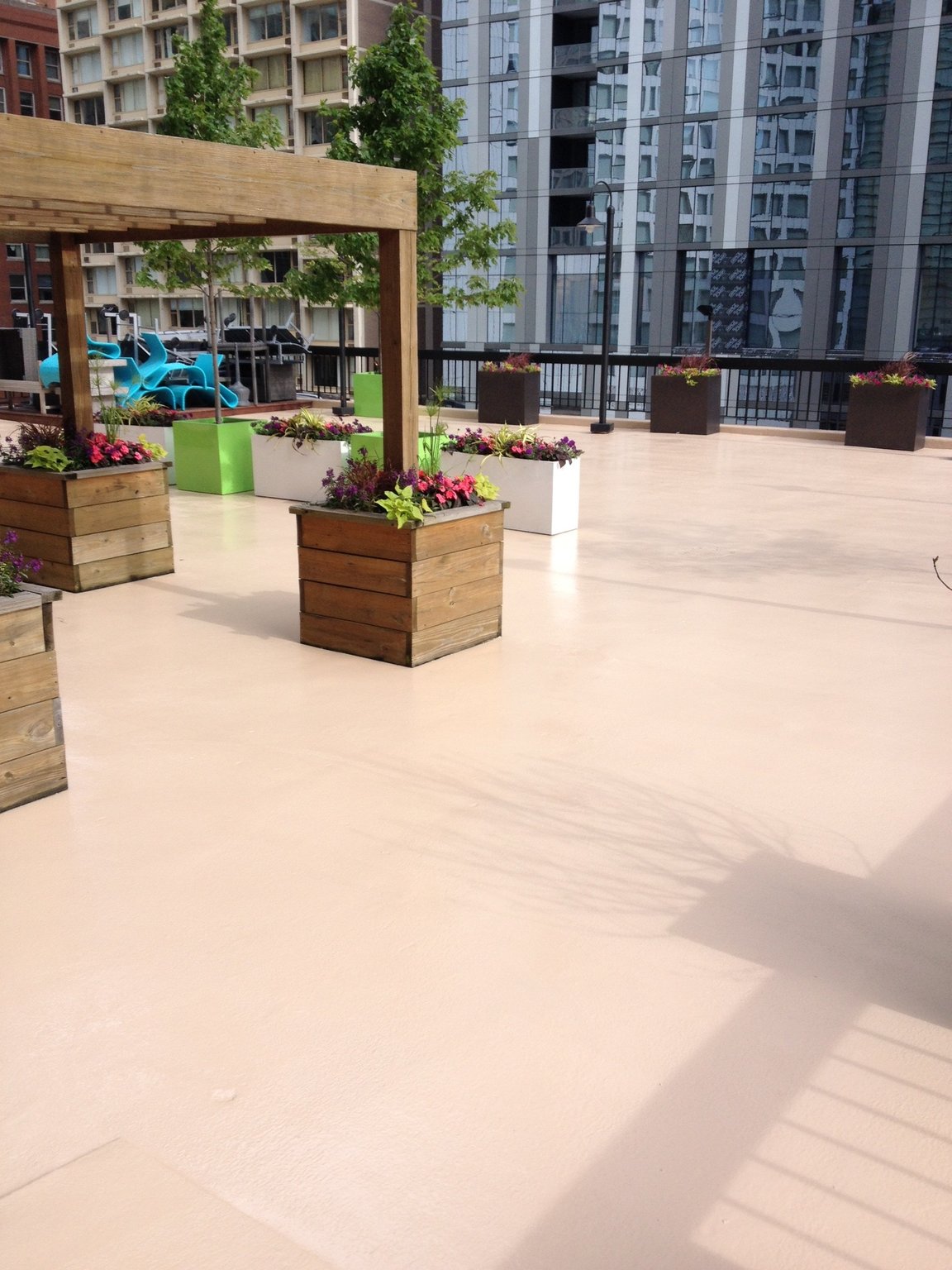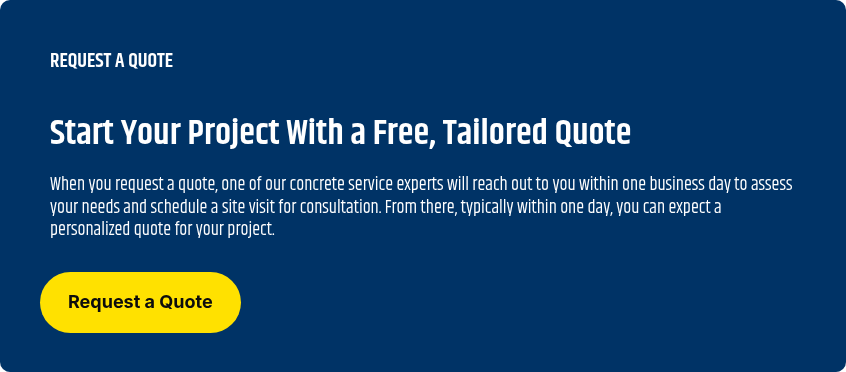
Selecting the right flooring for a commercial space is a crucial decision that affects durability, aesthetics, maintenance, and cost. With years of experience in commercial flooring, CustomCrete has helped businesses throughout Chicago select and install high-performance flooring solutions tailored to their needs.
In Chicago, where commercial properties experience high foot traffic and fluctuating weather conditions, businesses need flooring that can withstand daily wear and tear while maintaining a professional appearance.
This guide explores the best types of commercial flooring available, highlighting their benefits, challenges, and ideal applications to help decision-makers choose the best option for their business.
Factors to Consider When Choosing Commercial Flooring
Choosing the right commercial flooring involves evaluating several key factors to ensure durability, functionality, and cost-effectiveness. The right flooring can enhance a business's operations while minimizing long-term maintenance expenses.
Durability
Commercial spaces such as offices, retail stores, and restaurants experience heavy foot traffic. Choosing a flooring material that can endure daily use without premature wear is essential for long-term savings.
Maintenance Requirements
Different flooring types require different levels of upkeep. Some materials, like polished concrete, require minimal maintenance, while others, such as vinyl tile, may need regular waxing and refinishing.
Aesthetic Appeal
The look and feel of a commercial space contribute to customer impressions and employee satisfaction. Flooring should complement the brand image and create a welcoming environment.
Cost Efficiency
Upfront installation costs and long-term maintenance expenses should be factored into the decision. Some flooring options have a higher initial investment but lower maintenance costs, making them more cost-effective over time.
Climate Considerations
Chicago’s extreme temperature shifts and moisture exposure can impact certain flooring materials. Selecting moisture-resistant or temperature-stable flooring can prevent damage and prolong its lifespan.
Top Commercial Flooring Options in Chicago
Selecting the right commercial flooring requires an understanding of the various materials available, their benefits, and their best applications. The following options are among the most popular for businesses in Chicago, offering a balance of durability, aesthetics, and cost-effectiveness.
1. Polished Concrete
Best For: Warehouses, office spaces, retail stores, restaurants and showrooms.
Polished concrete is one of the most durable and cost-effective flooring options for commercial spaces. It provides a sleek, professional look while being resistant to stains, moisture, and heavy foot traffic. With its low maintenance requirements, businesses can avoid costly upkeep while maintaining a clean and modern aesthetic.
Pros of Polished Concrete:
- Long-lasting and highly durable.
- Requires minimal maintenance.
- Reflects light, reducing energy costs.
Cons of Polished Concrete:
- Initial installation costs can be high but are offset by long-term savings.
2. Epoxy Flooring
Best For: Industrial facilities, hospitals, restaurants, and garages.
Epoxy flooring is a highly durable and versatile option for commercial spaces that require chemical and impact resistance. Available in solid colors, decorative flakes, and metallic finishes, epoxy can be customized to fit the aesthetic needs of any business.
Pros of Epoxy Flooring:
- Extremely resistant to spills, stains, and abrasions.
- Available in various designs and textures.
- Can withstand heavy machinery and equipment use.
Cons of Epoxy Flooring:
- Requires professional installation for best results.
- A slip-resistant additive is recommended.
3. Urethane Cement Flooring
Best For: Food processing facilities, pharmaceutical plants, and commercial kitchens.
Urethane cement flooring is an excellent option for industries requiring extreme durability and chemical resistance. This seamless flooring solution is highly resistant to thermal shock, making it ideal for environments that experience extreme temperature fluctuations. It also provides superior resistance to moisture and heavy impact, ensuring a long-lasting surface that meets hygiene and safety requirements.
Pros of Urethane Cement:
- Highly resistant to extreme temperatures and chemical exposure.
- Seamless, non-porous surface prevents bacterial growth.
- Withstands heavy machinery and high-impact environments.
Cons of Urethane Cement:
- Higher initial cost compared to traditional flooring options.
- Requires professional installation for optimal performance.
4. Vinyl Composite Tile (VCT) & Luxury Vinyl Tile (LVT)
Best For: Office spaces, healthcare facilities, and retail stores.
VCT and LVT are cost-effective flooring options that mimic the appearance of more expensive materials like hardwood or stone. They are easy to clean and maintain, making them ideal for commercial spaces that require a balance between aesthetics and durability.
Pros of VCT & LVT:
- Affordable and available in a variety of styles.
- Provides comfort underfoot and reduces noise.
- Water-resistant and easy to clean.
Cons of VCT & LVT:
- Can be prone to scratches and wear over time which can lead to frequent replacements.
- Requires periodic waxing and refinishing.
5. Carpet Tiles
Best For: Corporate offices, hotels, and waiting areas.
Carpet tiles offer a combination of comfort, insulation, and aesthetic appeal, making them an excellent choice for offices and hospitality settings. They provide noise reduction and warmth while allowing for easy replacement if damaged.
Pros of Carpet Tiles:
- Soft underfoot, enhancing comfort.
- Available in various patterns and colors.
- Provides insulation and sound absorption.
Cons of Carpet Tiles:
- Prone to staining and requires regular deep cleaning.
- Not ideal for high-moisture environments.
6. Tile Flooring (Ceramic & Porcelain)
Best For: Restaurants, retail spaces, and high-moisture areas.
Tile flooring, particularly ceramic and porcelain, is a durable and visually appealing option for commercial spaces. It is highly resistant to moisture, making it an excellent choice for areas prone to spills.
Pros of Tile Flooring:
- Highly durable and water-resistant.
- Available in various styles and finishes.
- Easy to clean and maintain.
Cons of Tile Flooring:
- Can feel cold and hard underfoot.
- Grout lines require regular maintenance to prevent staining.
Which Commercial Flooring is Right for You?
Choosing the right types of commercial flooring depends on the specific needs of your business. If durability and low maintenance are top priorities, polished concrete or epoxy flooring may be ideal. For businesses seeking comfort and warmth, carpet tiles can create a welcoming environment. Meanwhile, tile flooring and vinyl options provide versatility and aesthetic appeal.
By understanding the advantages and limitations of each flooring type, decision-makers can select a long-lasting and cost-effective solution for their commercial space.
To learn more about flooring solutions tailored to Chicago businesses, read our next blog on “Urethane Cement vs Epoxy Flooring”.
